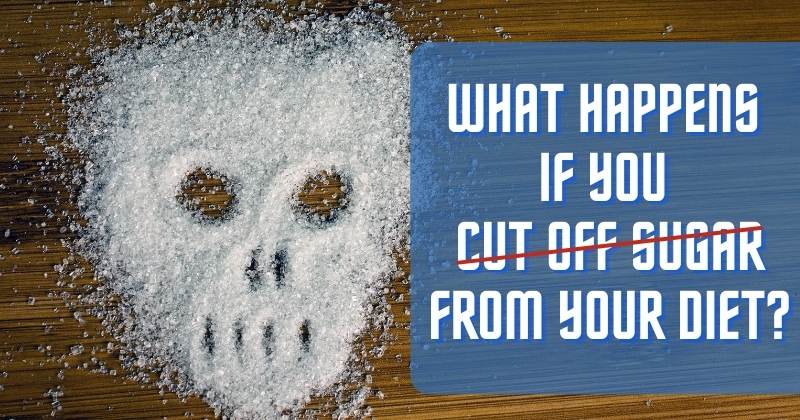Reducing or cutting off sugar from your diet is a popular trend among those who are health-conscious or looking to improve their overall well-being. While it may not be easy to do, many people claim that cutting off sugar from their diet has made them feel better, more energetic, and healthier. In this article, we’ll explore what happens to your body when you stop eating sugar and what you can expect.
First, let’s define what we mean by “sugar.” When we talk about sugar, we’re referring to added sugars, which are the sugars that are added to foods and drinks during processing or preparation. This includes white sugar, brown sugar, corn syrup, high-fructose corn syrup, honey, agave, and many other sweeteners. Naturally occurring sugars, such as those found in fruits and vegetables, are not included in this definition.

Cutting off sugar from your diet can have a wide range of effects on your body and health, both positive and negative. Here is a more in-depth look at what happens when you stop eating sugar:
1. Weight loss: One of the most noticeable effects of cutting sugar from your diet is weight loss. This is because sugar is high in calories and has no nutritional value. By eliminating it from your diet, you reduce your calorie intake, which can lead to weight loss over time. Additionally, sugar can trigger insulin resistance, which can lead to weight gain, especially around the midsection.
2. Improved blood sugar control: Sugar is a type of carbohydrate that raises your blood sugar levels. When you eat too much sugar, your body produces too much insulin, which can lead to insulin resistance and type 2 diabetes. By cutting sugar from your diet, you can help to improve your blood sugar control and reduce your risk of developing type 2 diabetes.
3. Reduced inflammation: Sugar can cause inflammation in the body, which can lead to a range of health problems, including heart disease, arthritis, and even some types of cancer. By eliminating sugar from your diet, you can help to reduce inflammation in your body and lower your risk of developing these conditions.
4. Improved cholesterol and blood pressure levels: Sugar consumption has been linked to high cholesterol and high blood pressure, both of which can increase your risk of heart disease. By cutting sugar from your diet, you can help to lower your cholesterol and blood pressure levels, which can reduce your risk of heart disease.

5. Reduced risk of chronic diseases: Sugar has been linked to a range of chronic diseases, including type 2 diabetes, heart disease, and certain types of cancer. By cutting sugar from your diet, you can help to reduce your risk of developing these conditions.
6. Reduced sugar cravings: Sugar can be addictive, and cutting it out of your diet can help to reduce your cravings for sweet foods over time.
7. Improved energy levels: While you may initially experience a drop in energy levels when you cut sugar from your diet, over time, you may find that your energy levels improve. This is because sugar can cause blood sugar spikes and crashes, which can leave you feeling tired and sluggish.
8. Better oral health: Sugar is one of the main culprits behind tooth decay and gum disease. By cutting sugar from your diet, you can help to improve your oral health and reduce your risk of developing these conditions.
Also Read: How to Avoid Consuming Refined Sugar?
Despite the many benefits of cutting sugar from your diet, there are also some potential downsides to consider. Here are some of the negative effects you may experience:
1. Sugar cravings: As mentioned, sugar can be addictive, and cutting it from your diet may lead to intense cravings for sweet foods. This can make it difficult to stick to a sugar-free diet.
2. Mood changes: Sugar can affect your mood and lead to feelings of anxiety and depression. When you cut sugar from your diet, you may experience mood swings as your body adjusts to the change.
3. Low energy levels: In the short term, you may experience a drop in energy levels as your body adjusts to the absence of sugar in your diet.
4. Nutrient deficiencies: Some sugary foods, such as fruit, also contain important nutrients. If you cut all sugar from your diet, you may need to find other sources of these nutrients to maintain a balanced diet.
5. Social pressure: Cutting sugar from your diet can be difficult in social situations, as many social events revolve around food and drink that may contain sugar. This can lead to feelings of isolation or social pressure to eat sugary foods.
In conclusion, cutting off sugar from your diet can have numerous health benefits, including weight loss, improved heart health, and lower risk of developing chronic diseases like diabetes and certain cancers. However, it’s important to note that cutting out sugar entirely may not be necessary or even feasible for everyone, and it’s always a good idea to consult a healthcare professional before making significant changes to your diet. Additionally, it’s important to be aware of hidden sources of sugar in many processed and packaged foods, and to focus on incorporating more whole, nutrient-dense foods into your diet to support overall health and wellness.


